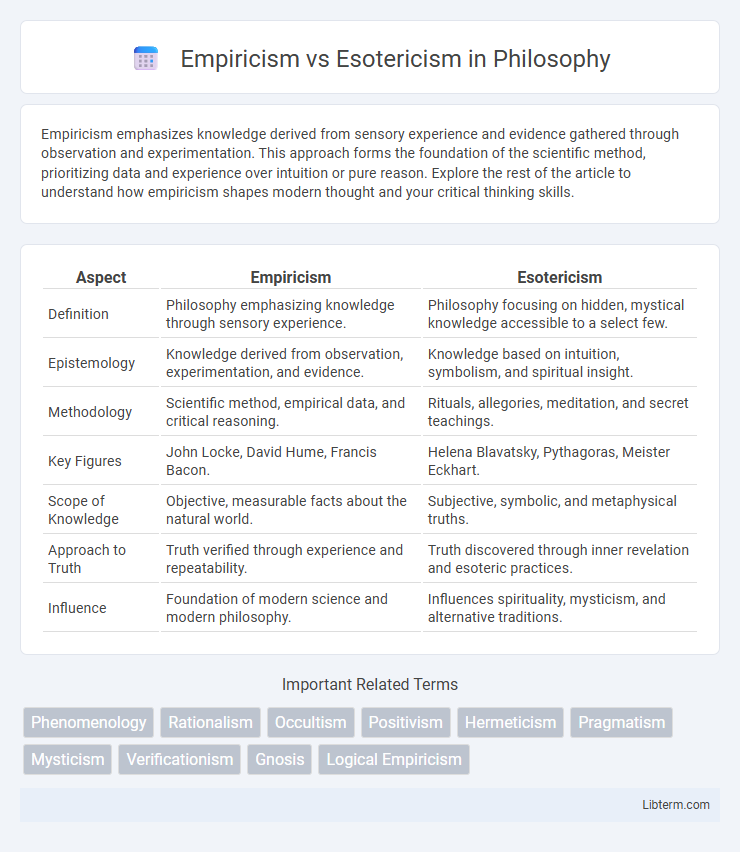Empiricism emphasizes knowledge derived from sensory experience and evidence gathered through observation and experimentation. This approach forms the foundation of the scientific method, prioritizing data and experience over intuition or pure reason. Explore the rest of the article to understand how empiricism shapes modern thought and your critical thinking skills.
Table of Comparison
| Aspect | Empiricism | Esotericism |
|---|---|---|
| Definition | Philosophy emphasizing knowledge through sensory experience. | Philosophy focusing on hidden, mystical knowledge accessible to a select few. |
| Epistemology | Knowledge derived from observation, experimentation, and evidence. | Knowledge based on intuition, symbolism, and spiritual insight. |
| Methodology | Scientific method, empirical data, and critical reasoning. | Rituals, allegories, meditation, and secret teachings. |
| Key Figures | John Locke, David Hume, Francis Bacon. | Helena Blavatsky, Pythagoras, Meister Eckhart. |
| Scope of Knowledge | Objective, measurable facts about the natural world. | Subjective, symbolic, and metaphysical truths. |
| Approach to Truth | Truth verified through experience and repeatability. | Truth discovered through inner revelation and esoteric practices. |
| Influence | Foundation of modern science and modern philosophy. | Influences spirituality, mysticism, and alternative traditions. |
Introduction to Empiricism and Esotericism
Empiricism emphasizes knowledge derived from sensory experience and scientific observation, prioritizing evidence-based understanding and measurable phenomena. Esotericism involves hidden, mystical knowledge accessible through intuition, spiritual insight, or secret teachings, often linked to metaphysical or occult traditions. The contrast highlights empirical methods grounded in observable data versus esoteric approaches relying on subjective, transcendent experience.
Historical Roots of Empirical Thought
Empirical thought traces its origins to ancient Greek philosophers such as Aristotle, who emphasized observation and experience as the basis of knowledge. During the Renaissance, figures like Francis Bacon further developed empiricism by advocating systematic experimentation and inductive reasoning. This foundation paved the way for the Scientific Revolution, where empirical methods became central to validating theories and understanding the natural world.
Origins and Evolution of Esoteric Traditions
Esoteric traditions trace their origins to ancient mystical and religious practices found in early civilizations such as Mesopotamia, Egypt, and Greece, where secret knowledge was passed through initiatory rites and symbolic teachings. Over centuries, these traditions evolved by incorporating elements from diverse cultures, including Hermeticism, Gnosticism, and alchemy, emphasizing personal spiritual transformation and hidden wisdom beyond empirical observation. This evolution contrasts sharply with empiricism, which relies on sensory experience and scientific methods, highlighting the divergent paths in understanding reality through mystical insight versus observable evidence.
Core Principles of Empiricism
Empiricism emphasizes knowledge derived from sensory experience, asserting that observation and experimentation form the foundation of understanding. Core principles include the rejection of innate ideas, reliance on inductive reasoning, and the continuous testing of hypotheses through empirical evidence. This approach contrasts sharply with esotericism, which prioritizes hidden, mystical knowledge accessible only through intuition or secret teachings.
Key Concepts in Esotericism
Esotericism centers on hidden knowledge, spiritual mysteries, and the pursuit of inner transformation through symbolic interpretations and metaphysical practices. Key concepts include theurgy, alchemy, astrology, and hermeticism, which emphasize personal enlightenment and the interconnectedness of the universe. These ideas contrast with empiricism's reliance on sensory experience and scientific methodology for understanding reality.
Methods of Knowledge Acquisition: Observation vs. Intuition
Empiricism relies on systematic observation and sensory experience as the primary methods for acquiring knowledge, emphasizing measurable evidence and repeatable experiments. Esotericism, in contrast, values intuition, inner revelation, and mystical insights, often transmitted through symbolic or transcendent experiences beyond sensory perception. These contrasting approaches highlight the empirical focus on external validation versus the esoteric emphasis on internal, subjective understanding.
Influence on Science and Spirituality
Empiricism emphasizes observation and experimentation as foundational methods in scientific inquiry, driving technological advancements and shaping modern epistemology. Esotericism influences spirituality by promoting inner knowledge, mysticism, and symbolic interpretation, fostering personal transformation and alternative worldviews. The interplay between empiricism and esotericism highlights the tension between objective evidence and subjective experience in understanding reality.
Empiricism and Esotericism in Modern Society
Empiricism in modern society emphasizes evidence-based knowledge derived from sensory experience and scientific methods, driving technological innovation and critical thinking in education and policy-making. Esotericism, often linked to mystical and hidden knowledge, persists in contemporary culture through alternative spirituality, holistic wellness practices, and underground movements seeking meaning beyond empirical validation. The tension between empiricism and esotericism reflects broader societal debates on rationality versus belief, shaping discourse in science, religion, and philosophy.
Common Misconceptions and Critiques
Empiricism is often misunderstood as relying solely on sensory experience, neglecting rational analysis, while esotericism is frequently criticized for promoting obscure knowledge detached from verifiable evidence. Common misconceptions conflate empiricism with strict scientific positivism, ignoring its philosophical nuances, and portray esotericism as inherently irrational or pseudoscientific without acknowledging its symbolic and metaphysical frameworks. Critics argue empiricism struggles with subjective experience and theoretical limits, whereas esotericism faces challenges of ambiguity and interpretative variability.
Bridging the Divide: Toward Integrative Understanding
Empiricism emphasizes knowledge derived from sensory experience and scientific observation, while esotericism involves hidden, mystical, or spiritual insights often inaccessible to empirical methods. Bridging the divide requires integrating empirical evidence with esoteric wisdom to foster a holistic understanding of reality that respects both measurable phenomena and subjective, transcendent experiences. This integrative approach encourages interdisciplinary dialogue, combining rational inquiry with intuitive exploration to enrich human knowledge.
Empiricism Infographic

 libterm.com
libterm.com